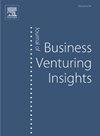Which signals matter most? A meta-analytic study of early-stage investment decisions
Q1 Business, Management and Accounting
引用次数: 0
Abstract
One Size Fits None: Tailoring Your Pitch for Investor Success.
Look at almost any entrepreneur's funding pitch and you see a template of information most investors would expect – what technology their venture has, the entrepreneur's prior experience, the social networks they leverage, and their passion for the idea and venture. But does this “one size fits all approach” work equally well in securing the funding they need? Through our study of over 100 published papers reflecting millions of investment decisions, we find that the answer is no; instead, different types of investors prioritize different kinds of information – and these differences drastically change their funding decisions.
For early-stage entrepreneurs who seek funding to launch and grow their businesses, it's important to understand that while all investors care about an entrepreneur's human capital (i.e., their education and experience), what impresses one type of investor might discourage another. For instance, angel investors and reward crowdfunders invest when they see displays of positive affect – such as passion. Not only that, but angels value passion as much as human capital. Meanwhile, venture capitalists often view these displays negatively, preferring concrete evidence of an entrepreneur's social connections and a venture's technology instead. These differences occur among crowdfunders as well – whereas equity crowdfunders value the entrepreneur's human capital but not their social network, reward crowdfunders prioritize the entrepreneur's social network, but value it substantially less than displays of passion. Our analysis also reveals research gaps – there is an overemphasis on crowdfunders compared to angel investors and venture capitalists, and stark differences in funding decisions depending on whether the decision is real or experimental.
The implications are clear: when pitching to a particular investor, it's important for entrepreneurs to tailor communication to emphasize what that investor values most. This targeted approach doesn't just boost the chances of securing funding—it maximizes the effectiveness of your overall fundraising efforts.
哪些信号最重要?早期投资决策的元分析研究
一刀切:为投资者的成功量身定制你的演讲。看看几乎所有企业家的融资推介,你都会看到大多数投资者期望的信息模板——他们的企业拥有什么技术,企业家之前的经验,他们利用的社交网络,以及他们对这个想法和企业的热情。但是,这种“一刀切”的方法在确保他们所需的资金方面同样有效吗?通过对100多篇反映数百万投资决策的已发表论文的研究,我们发现答案是否定的;相反,不同类型的投资者优先考虑不同类型的信息——这些差异极大地改变了他们的投资决策。对于寻求资金启动和发展业务的早期企业家来说,重要的是要明白,尽管所有投资者都关心企业家的人力资本(即他们的教育和经验),但让一类投资者印象深刻的东西可能会让另一类投资者望而却步。例如,天使投资者和奖励众筹者在看到积极影响的表现时进行投资——比如激情。不仅如此,天使投资人同样看重热情和人力资本。与此同时,风险资本家往往对这些表现持负面看法,他们更喜欢企业家的社会关系和风险投资技术的具体证据。这些差异也发生在众筹者之间——股权众筹者重视企业家的人力资本,而不是他们的社交网络;奖励众筹者优先考虑企业家的社交网络,但其价值远远低于热情的表现。我们的分析也揭示了研究的差距——与天使投资者和风险资本家相比,人们过于强调众筹者,而且根据决策是真实的还是实验性的,在融资决策方面存在明显差异。其中的含义很明显:在向某个特定的投资者推销时,对企业家来说,重要的是要调整沟通方式,强调投资者最看重的是什么。这种有针对性的方法不仅可以增加获得资金的机会,还可以最大限度地提高整体筹款工作的效率。
本文章由计算机程序翻译,如有差异,请以英文原文为准。
求助全文
约1分钟内获得全文
求助全文
来源期刊

Journal of Business Venturing Insights
Business, Management and Accounting-Business and International Management
CiteScore
11.70
自引率
0.00%
发文量
62
审稿时长
28 days
 求助内容:
求助内容: 应助结果提醒方式:
应助结果提醒方式:


